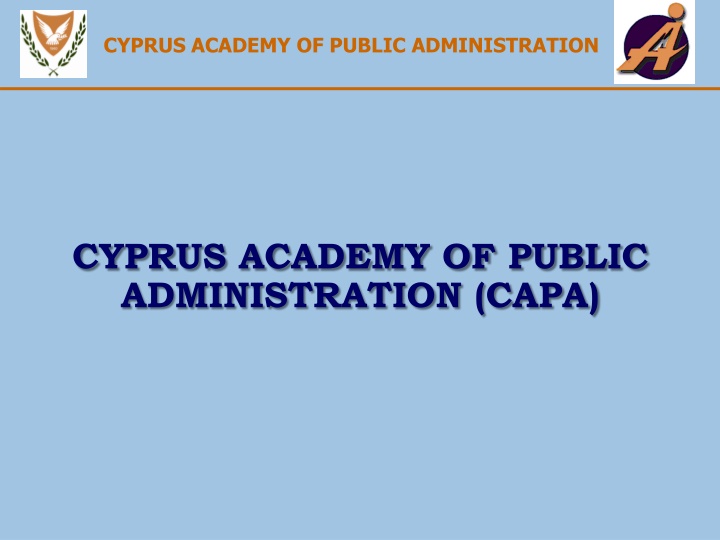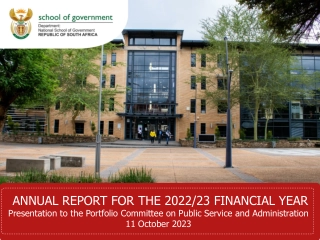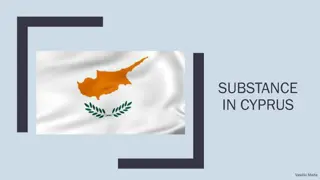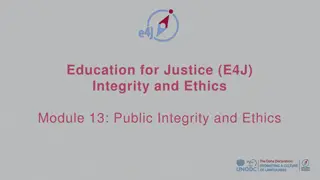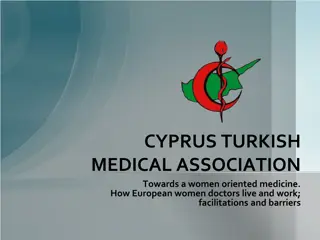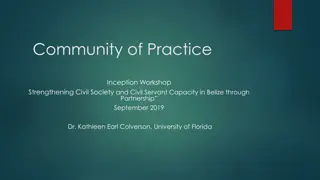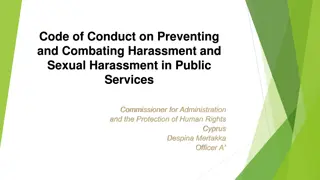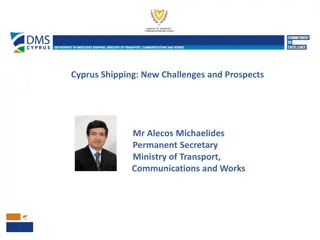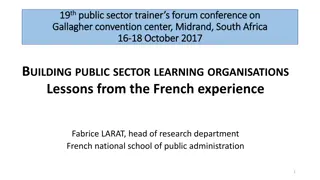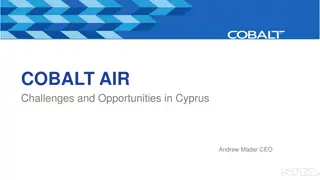Cyprus Academy of Public Administration: Empowering Civil Servants Through Learning and Development
Established in 1991, the Cyprus Academy of Public Administration (CAPA) aims to modernize the Cyprus Civil Service by formulating and implementing learning policies. With a vision of creating a citizen-centered public service, CAPA offers training programs, support for gender equality issues, and networking opportunities. Their activities include decentralized management of learning, consulting support for reform, and horizontal learning initiatives. CAPA has been actively involved in training civil servants on gender equality issues, such as combating sexual harassment in the workplace. They have conducted numerous training programs and are assisting Civil Service departments in establishing Gender Equality Committees.
Download Presentation

Please find below an Image/Link to download the presentation.
The content on the website is provided AS IS for your information and personal use only. It may not be sold, licensed, or shared on other websites without obtaining consent from the author.If you encounter any issues during the download, it is possible that the publisher has removed the file from their server.
You are allowed to download the files provided on this website for personal or commercial use, subject to the condition that they are used lawfully. All files are the property of their respective owners.
The content on the website is provided AS IS for your information and personal use only. It may not be sold, licensed, or shared on other websites without obtaining consent from the author.
E N D
Presentation Transcript
CYPRUS ACADEMY OF PUBLIC ADMINISTRATION CYPRUS ACADEMY OF PUBLIC ADMINISTRATION (CAPA)
CYPRUS ACADEMY OF PUBLIC ADMINISTRATION WHO WE ARE? Established in 1991 by decision of the Council of Ministers Unit of the Public Administration and Personnel Department, which belongs to the Ministry of Finance Small organization, now numbering 21 employees (14 training officers and 7 support staff) Additional trainers and associates from the Cyprus public and private sectors and from abroad Our mission has been to contribute to the modernization of the Cyprus Civil Service through learning and development activities - more precisely through the formulation and implementation of a learning policy for the Civil Service at individual, group and organizational levels. 2
CYPRUS ACADEMY OF PUBLIC ADMINISTRATION OUR VISION Our vision is to make a significant contribution to the creation of a modern, citizen-centred public service, being ourselves a model public service organisation - a learning and development organisation that practices what it preaches and enjoys local, european and international recognition. 3
CYPRUS ACADEMY OF PUBLIC ADMINISTRATION 4 MAIN AREAS / ACTIVITIES A. Decentralized Management of Learning (Learning Units in each organisation) B. Learning and Consulting Support of Reform and Change (e.g. EU co-funded Projects) C. Horizontal Learning Initiatives and Basic Training Programs D. Local and international networking and support processes for the management of learning 4
CYPRUS ACADEMY OF PUBLIC ADMINISTRATION ACTIVITIES CONCERNING GENDER EQUALITY ISSUES Since 2012 we were involved in the design, organisation,implementation and evaluation of several seminars concerning gender equality issues. I will refer particularly to the training titled Combating sexual harassment and harassment in the workplace , a training to inform the Civil Servants about the Code of Conduct on Preventing and Combating Harassment and Sexual Harassment in Public Services issued by the Commissioner for Administration and Human Rights (Ombudsman) and the Gender Equality Committee. From 2019- 2021 we have conducted 25 training programs and trained 570 Civil Servants on the Code. It is also expected that every Department of the Civil Service will develop a Gender Equality Committee and CAPA is responsible to held a more specific training in order to help all the members of the committees implement effectively their role. The training of committees is in progress these days, but we have already trained 145 Civil Servants, on the above mentioned period. 5
CYPRUS ACADEMY OF PUBLIC ADMINISTRATION KEY CHALLENGES AND HOW TO OVERCOME THEM Our main challenge was the restrictions on gathering due to the pandemic, which we have managed to overcome through the use of technology. We have organised online programs in the times of corona which have run smoothly in the beginning as employees where watching them from home. But considering low speed of internet connections in the offices, we had some difficulties when returning back to natural presence. This was managed by not using cameras throughout the sessions. 6
